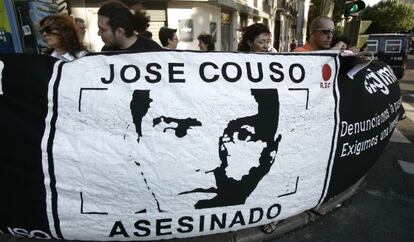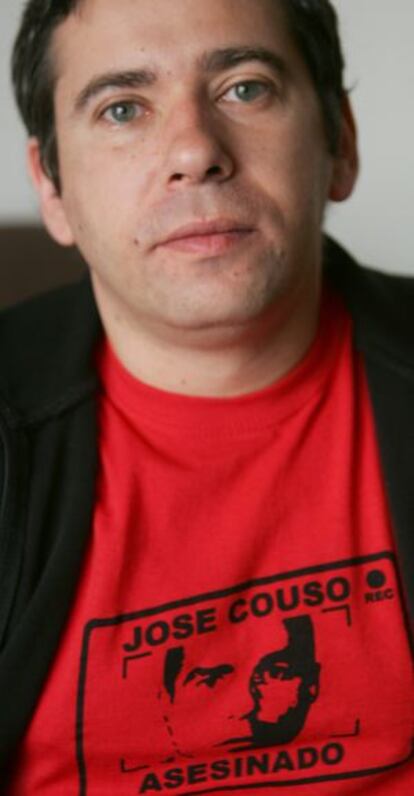“This reform is the work of a subservient government”
Family of TV cameraman killed in Iraq outraged by plan for universal justice cases

The family of José Couso, a TV cameraman who was killed in Iraq by US soldiers 11 years ago, has very strong opinions about the government’s plan to stop Spanish courts from accepting universal jurisdiction cases.
“This is absolutely infuriating,” says Javier, brother of the Telecinco employee who was sent to cover the Iraq War, and who died on April 8, 2003 when US forces shelled the Hotel Palestine, where he was staying with other journalists. The Spanish High Court opened a criminal investigation against three US servicemen involved in the incident, although classified cables released by WikiLeaks later confirmed that the American Embassy in Madrid maneuvered to get the case dropped.
The Popular Party (PP) government wants to reform the law so that Spanish judges will only accept cases where the alleged crimes have either been perpetrated by a Spaniard, a foreigner who resides in the country regularly, or else a foreigner whom Spain refuses to extradite. This would mean an end to the Couso case, among others.

Experts feel that the bill, which was presented in Congress last Monday and marked as urgent, is mainly aimed at appeasing Beijing, which has shown great concern at the Spanish High Court’s current inquiry into leading Chinese Communist Party officials over human rights abuses in Tibet. Spain views China as a land of financial opportunity, with great potential for its own firms.
Another High Court case that could be shelved under the new legislation involves the clandestine CIA flights to take Al Qaeda suspects to Guantanamo following the September 11, 2001 terrorist attacks, which flew from Spanish air bases and through Spain’s airspace. The principle of universal jurisdiction also allowed former High Court Judge Baltasar Garzón to have Chilean ex-dictator Augusto Pinochet arrested in 1998 for the alleged torture and death of Spanish nationals.
“If [the bill] passes, we are going to appeal here and abroad, I suppose to the European Court of Human Rights in Strasbourg. We have faith in universal justice,” explains Javier Couso. “This reform is the work of a government that is subservient to the United States. It is a traitorous government that does not seek to defend the homeland or its own citizens, just financial and foreign interests. It is cutting back on fundamental rights.”
Javier Couso also calls this bill “an insult by [Justice] Minister Alberto Ruiz-Gallardón to families with victims. I don’t know what adjective to use to describe him without insulting him. He is an Attila, a traitor.”
The investigation into Couso’s death has entailed a long battle with the US government, which has repeatedly refused to honor requests from the High Court for information. If the Spanish parliament passes the bill, the Couso case would be dropped.
“It’s shocking — so much incompetence in the face of murders outside Spain. Not just my brother but so many other crimes. I am indignant, our government is doing things worse by the day,” adds Bárbara Couso, José’s sister.
Now, the family hopes that the opposition Socialists will appeal the constitutionality of the bill. “If not, then we have confidence in the reaction of the Spanish people,” says Javier. “We are not stopping here!”
Tu suscripción se está usando en otro dispositivo
¿Quieres añadir otro usuario a tu suscripción?
Si continúas leyendo en este dispositivo, no se podrá leer en el otro.
FlechaTu suscripción se está usando en otro dispositivo y solo puedes acceder a EL PAÍS desde un dispositivo a la vez.
Si quieres compartir tu cuenta, cambia tu suscripción a la modalidad Premium, así podrás añadir otro usuario. Cada uno accederá con su propia cuenta de email, lo que os permitirá personalizar vuestra experiencia en EL PAÍS.
¿Tienes una suscripción de empresa? Accede aquí para contratar más cuentas.
En el caso de no saber quién está usando tu cuenta, te recomendamos cambiar tu contraseña aquí.
Si decides continuar compartiendo tu cuenta, este mensaje se mostrará en tu dispositivo y en el de la otra persona que está usando tu cuenta de forma indefinida, afectando a tu experiencia de lectura. Puedes consultar aquí los términos y condiciones de la suscripción digital.








































